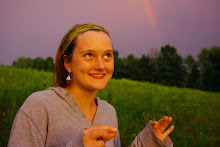Describe the past and present of food. Predict the future of food, with reference to class materials and historical trends.
Food: The Past and Present
When most people think about the history of food they think about the ideal or cliché family farm, with the barn and the livestock and the eatable plants in the fields. Or they think about the Indians who grew corn and shared thanksgivings with the pilgrims. What people are really thinking about the history of agriculture, which accounts for only about 1% of the history of our food; for millions of years human collected all their food through hunting and gathering. Hunter-gatherers lived in small groups of people who occupied (but did not own) and survived off of the unmanipulated land. This required that the tribes of people stay small; a mother could only have a child every four years because the lifestyle required the mother to carry their children until they were old enough to keep up with the rest of the group. But when groups grew larger and people needed an easier way to feed themselves, agriculture was a very viable solution. And from there agriculture (and the world’s population) grew and developed into what we think of as the family farm that feeds everyone.
What was diverse agriculture became corn and soy agriculture, most of what the farmers in the US grow and most of what we eat is corn. Type-2 corn (not the sweet kind you eat at your dinner table) is grown and then distributed where it is processed (broken down into its many different parts and then put back together in the form of cereal or a Twinkie) or it is made into food to fatten our meat. The problem with corn, while it is easy and cheap to grow, is that we are not designed to eat it and neither are the animals. We are Omnivores and therefore, yes we are designed to eat all sorts of thing, corn included, but the mass production of corn has resulted in epidemics like obesity and diabetes. We have evolved over millions of years to become the humans we are, it is in significantly less than 1% of that time that we have started eating food like McDonalds and thrown ourselves into a food system with almost entirely processed foods, full of chemical and pesticides.
And the cows, who are herbivores and have stomachs designed to digest grass (not corn), which results in problems with the enzymes, bacteria and other diseases they carry. Once the cows reach slaughter weight (in 14 months rather than several years), they are killed, disassembles and processed. Within the processes of producing meat there are many complex issues, like those of the poor immigrant works and of the quality of the meat (20% of the time guts are broken and the meat is covered in shit). The entire process, which most of America is completely disassociated with, all gets carried onto our plates.
The most crucial part of our food system isn’t the corn though, and it’s not the processing either, it’s the fossil fuels. Without the fossil fuels there would no way to produce all the food for all the people in this country or this world. The farmers are dependent on them for their fertilizers, pesticides and tools (for example tractors), and so are the slaughterhouses, processing plant and especially the transportation companies. And with peak oil in the near future we have an even bigger problem than just the shit and chemicals on our food.
Food: The Future
Eventually, when there isn’t enough fossil fuel to run the food system we have now, there will have to be some major changes in the food we are eating and the way we get our food. In the past 100 years our culture has developed massive technology and grown by the billions. There is no way that this planet can support such an intrusive species that draws out all its resources and then continues to grow. If I were to predict what our food system will look like in the future, after peak oil hits I would say that it is possible that someone will try to invent a pill that supplements all the human nutritional values but I don’t actually think that will work. What I actually think will happen is that many people will starve and the population will decrease. Those who survive will have to grow their own food, hunt and gather their own food or depend on another person/family in the local area to do so.
The current food system is one example of how humans have pushed the earth past its limitations, and this planet isn’t designed to support what humans are trying to do. I believe this planet is designed to adapt but I definitely think there is a limit, if it hasn’t been passes yet it will be shortly; because (despite the fact that they think they do) humans do not have the power to live without the natural world that exists on earth and earth is going to force humans back to a way of life that is sustainable and without the magic of fossil fuels. That means a food systems and a life style that is scaled back, local and mostly independent from strangers.
Saturday, June 2, 2007
Subscribe to:
Post Comments (Atom)

No comments:
Post a Comment